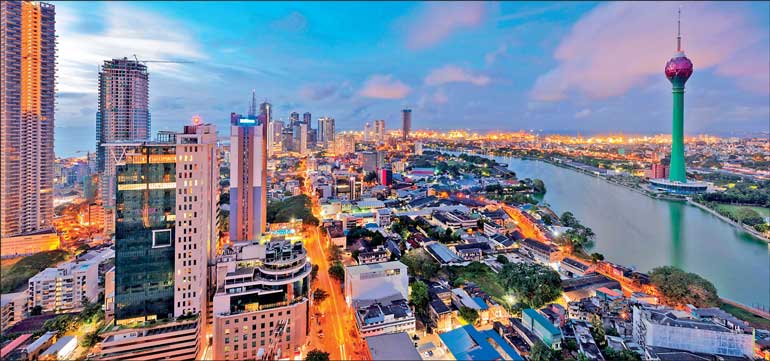Monday Feb 23, 2026
Monday Feb 23, 2026
Tuesday, 9 July 2024 00:28 - - {{hitsCtrl.values.hits}}

 Sri Lanka is currently experiencing a pivotal moment in its economic development trajectory. Raising the socioeconomic standing of the populace requires pursuing inclusive economic growth and more investment from the private sector. By examining crucial approaches, recognising obstacles, and assimilating global best practices, Sri Lanka may clear the path towards a future that is both affluent and just.In 2024, Sri Lanka will be negotiating a challenging economic environment that includes persistent budgetary issues, efforts to stabilise macroeconomic circumstances, and the post-pandemic recovery. Remittances from foreign workers, advances in the tourism industry, and increased agricultural output have all contributed to the nation’s GDP growth. Nonetheless, enduring obstacles including the nation’s massive public debt, inflationary pressures, and fundamental economic shortcomings continue to provide formidable obstacles.In order to improve public sector efficiency, strengthen budgetary discipline, and foster an atmosphere that is more favourable to investment and enterprise, the Government has instituted a number of changes. Comprehensive plans are still desperately needed in order to ensure sustainable and equitable economic growth, notwithstanding these efforts.
Sri Lanka is currently experiencing a pivotal moment in its economic development trajectory. Raising the socioeconomic standing of the populace requires pursuing inclusive economic growth and more investment from the private sector. By examining crucial approaches, recognising obstacles, and assimilating global best practices, Sri Lanka may clear the path towards a future that is both affluent and just.In 2024, Sri Lanka will be negotiating a challenging economic environment that includes persistent budgetary issues, efforts to stabilise macroeconomic circumstances, and the post-pandemic recovery. Remittances from foreign workers, advances in the tourism industry, and increased agricultural output have all contributed to the nation’s GDP growth. Nonetheless, enduring obstacles including the nation’s massive public debt, inflationary pressures, and fundamental economic shortcomings continue to provide formidable obstacles.In order to improve public sector efficiency, strengthen budgetary discipline, and foster an atmosphere that is more favourable to investment and enterprise, the Government has instituted a number of changes. Comprehensive plans are still desperately needed in order to ensure sustainable and equitable economic growth, notwithstanding these efforts.
In order to ensure sustained growth and lessen sensitivity to external shocks, economic diversification is crucial. Due to its extreme reliance on a small number of businesses, like tea and textiles, Sri Lanka has to diversify into high-value areas like sophisticated manufacturing, renewable energy, and information technology.
Invest in education and skill development
To increase productivity and promote innovation, it is essential to invest in education and skill development. Human capital can be greatly increased by fortifying vocational training programs, raising the standard of elementary and secondary education, and matching postsecondary education to industry demands. Forecasts show increases in tertiary education enrolment, involvement in vocational training, and literacy rates by 2024. Developing human capital is essential to creating a competitive workforce that can spur economic expansion.
Strong institutions and efficient governance are essential for economic expansion. Improving regulatory effectiveness, accountability, and transparency are all part of building institutional capacity. Policies targeted at lowering bureaucratic red tape, enhancing the provision of public services, and thwarting corruption can improve the business climate. These actions are essential for building confidence and trust among both residents and investors.
Encouraging and maintaining private sector investment requires a favourable business climate. Incentives for startups and SMEs, lower compliance costs, and streamlined business registration procedures can all encourage innovation and entrepreneurship. The position of Sri Lanka in the World Bank’s 2024 Ease of Doing Business index would show advancements or regressions in a number of areas, including establishing a company, obtaining finance, and upholding agreements.
Development of infrastructure
The development of infrastructure is essential to both economic growth and competitiveness. Investing in digital, energy, and transportation infrastructure may save costs, increase connections, and facilitate market access. Infrastructure project investment from the private sector can be mobilised through the use of public-private partnerships, or PPPs. Important infrastructure initiatives in Sri Lanka, like the national highway network, the Colombo Port City, and the growth of renewable energy, demonstrate the possibility of major economic gains from well-considered investments.
Open and competitive trade and investment policies are crucial for Sri Lanka’s integration into the world economy. Exports can be increased and foreign direct investment (FDI) can be drawn in by negotiating advantageous trade agreements, lowering tariff barriers, and putting in place investor-friendly regulations.
Sri Lanka can benefit much from understanding best practices and successful case studies. Effective policies have been put in place by nations like Singapore and Vietnam to draw in foreign direct investment, advance industrialisation, and achieve inclusive growth. The significance of stakeholder involvement, policy coherence, and strategic planning is demonstrated by these examples. Sri Lanka can improve its economic prospects and build a more inclusive economy by implementing comparable strategies.
Even with the bright future of more private sector investment and equitable economic growth, there are still a number of hazards and obstacles that need to be addressed. Among these are socioeconomic inequality, environmental sustainability, and political instability. It takes a coordinated effort from the public, business, and civil society sectors to mitigate these risks. Sri Lanka can create an economy that is more robust and egalitarian by encouraging cooperation and making sure that prosperity benefits all facets of the community.
Multimodal strategy
For Sri Lanka’s socioeconomic development, encouraging inclusive economic growth and boosting private sector investment are essential. Sri Lanka can create a robust and dynamic economy by implementing a multimodal strategy that combines infrastructure investment, institutional improvement, human capital development, and economic diversification. To achieve these goals, cooperative efforts and ongoing policy changes are necessary.
The most recent information and analysis from reliable sources like the World Bank, Asian Development Bank, and Institute of Policy Studies supports the nation’s path towards economic progress and prosperity. These resources offer insightful data about the status of the economy right now and the results of various projects and policies. For example, the World Bank’s blog post on drawing in foreign investment lists six essential ways Sri Lanka may improve its attractiveness to foreign investors. The national partnership plan for 2024–2028 by the Asian Development Bank places a strong focus on the necessity of strategic investments and legislative changes to promote sustainable growth.
In conclusion, a thorough and well-coordinated strategy is needed for Sri Lanka to achieve inclusive economic growth and greater private sector investment. Sri Lanka can build a more affluent and just future for all of its residents by emphasising economic diversification, developing human capital, bolstering institutional capacity, upgrading the business environment, and making infrastructural investments. To achieve these aims, the nation must remain committed to ongoing policy reforms and cooperation with foreign partners. By making these efforts, Sri Lanka can develop a robust economy that serves the interests of everybody and realise its full economic potential.
References:
World Bank. (2024). “Six Ways Sri Lanka Can Attract More Foreign Investments”. Retrieved from World Bank Blog.
Asian Development Bank. (2024). “Sri Lanka Country Partnership Strategy 2024-2028”. Retrieved from ADB.
Institute of Policy Studies. (2016). “The Ready-Made Garment Industry in Sri Lanka”. Retrieved from IPS.
Central Bank of Sri Lanka. (2024). “Annual Report 2023”.
Ministry of Education, Sri Lanka. (2024). “Education Statistics 2023”.
Ministry of Finance, Sri Lanka. (2024). “National Infrastructure Plan 2024”.
(The writer is a Senior Consultant.)